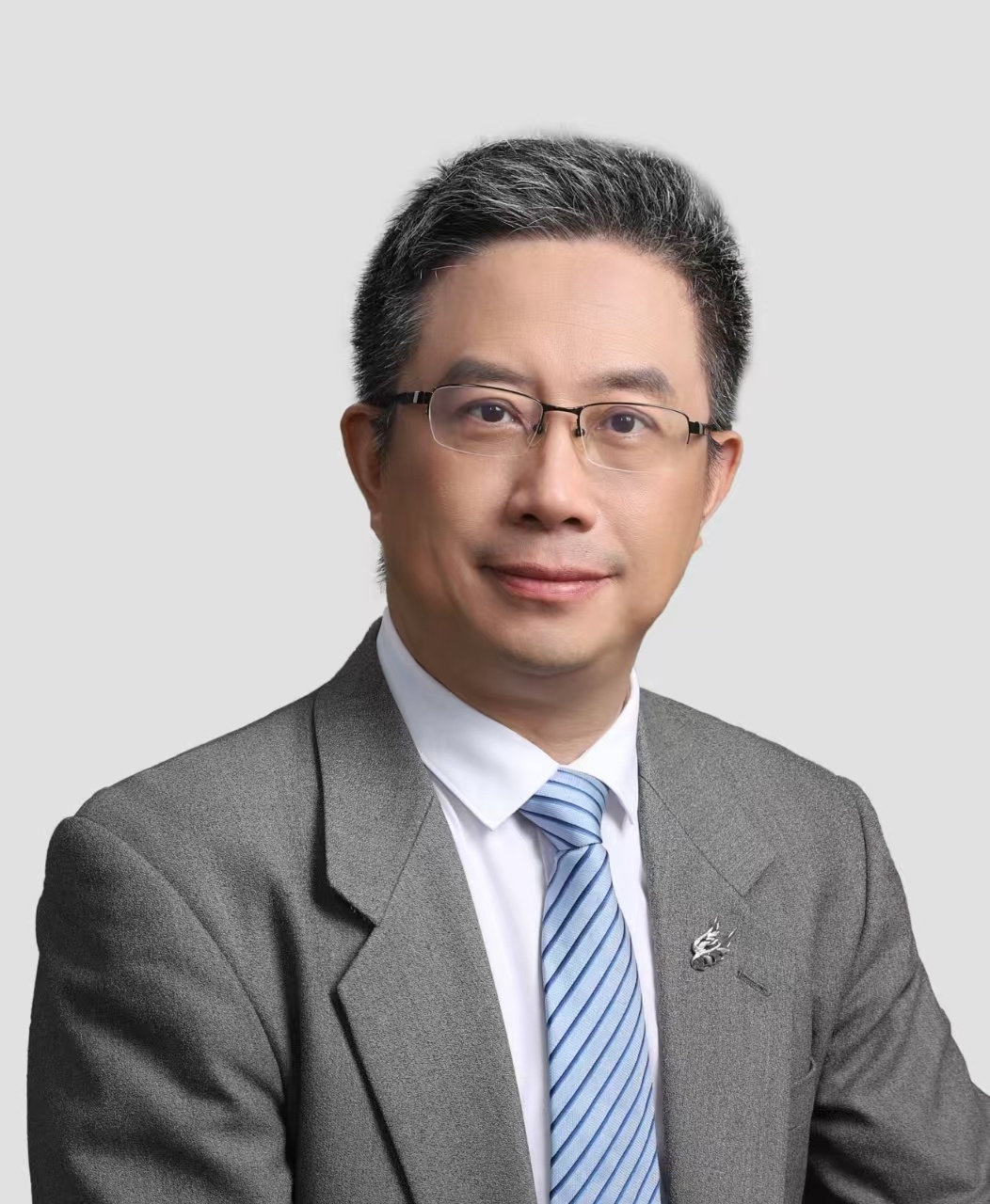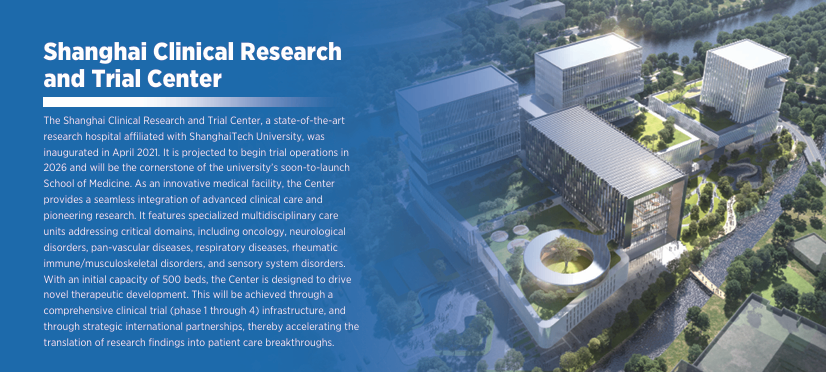

Chouwen Zhu, MD
Founding Director (President)
Shanghai Clinical Research and Trial Center
ShanghaiTech University
A gastroenterologist and clinical epidemiologist by training, Dr. Zhu is currently leading the establishment of a research-oriented tertiary-care hospital. Before joining ShanghaiTech University in 2021, Dr. Zhu served as Vice President of Zhongshan Hospital and as a Professor of Medicine at Shanghai Medical College, Fudan University. He received an MD from Peking Union Medical College in 1992 and an MSc in Clinical Epidemiology from Chulalongkorn University, Thailand, in 1996.
Q: What motivated you to establish the Shanghai Clinical Research and Trial Center?
The importance of clinical research in medicine has been widely recognized in recent years, leading to remarkable achievements both in China and globally. After graduating from Peking Union Medical College, I joined Zhongshan Hospital in Shanghai and later received support from the International Clinical Epidemiology Network to study health development and research methodology at Chulalongkorn University in Thailand. My subsequent work in the U.S., focusing on clinical and clinical-oriented basic research, deepened my passion for advancing clinical research. Throughout my administrative and clinical roles, I have been committed to promoting the standardization and advancement of clinical research in China. The establishment of the Shanghai Clinical Research and Trial Center (the Center) fulfills this long-held aspiration.
Although clinical research in China has made progress, it still lags behind global standards. Many hospitals focus primarily on medical services while providing inadequate support for scientific research, as a result, progress is hindered. Additionally, there is a need to improve the standardization, quality, and to advance clinical research, particularly in areas like human resources, research design, and the integration of clinical, basic, applied, and translational research. For instance, while numerous research initiatives emerged during the Covid-19 pandemic, few made significant international impact.
The Center was established to address these challenges by creating a comprehensive platform that integrates clinical services, research, and innovation.
Shanghai, as China's economic and technological hub, has unique advantages in biomedicine and artificial intelligence. One of the Center’s goals is to collaborate closely with institutions and enterprises in Zhangjiang Hi-Tech Park to foster “zero to one” innovations in medical technology and develop biomedical products that benefit patients. The “industry-university-research” integration model is a cornerstone of the Center’s development. We also plan to leverage AI and big data to enhance research e ciency and accelerate the translation of findings into clinical applications.
The Center will set up a full-cycle, closed-loop system from basic research to clinical translation, focusing not only on generating scientific findings but also on their practical application. We will invest in research on both common and rare diseases, ensuring that our work delivers tangible benefits to patients. Ultimately, our goal is to drive the breakthrough development of China’s biomedical industry, and elevate Shanghai’s healthcare system and biomedical sector to global standards, and thus position the city as a global hub for technological innovation and an international model for healthy living.
Q: What innovative operational
mechanisms will the Center adopt?
The Center stands out as both a tertiary general hospital and a leading research institution. At the core of our model is the deep integration of medical services and scientific research, closely linked with top innovative universities.
First, we will establish a cross-disciplinary collaboration framework. By partnering with institutions such as School of Life Science and Technology and School of Biomedical Engineering at ShanghaiTech University, we will break down traditional disciplinary silos. This will foster close cooperation among scientists, clinicians, public health experts, engineers, and data scientists. Clinical challenges will guide basic research, and research findings will be rapidly applied to clinical practice through a two-way feedback loop, accelerating the translation of research into improved patient outcomes.
We will also innovate in resource allocation and management to ensure continuous support for scientific research. A flexible bed and resource allocation system will allow dynamic adjustments based on research needs. Additionally, intelligent management systems will optimize resource utilization, to bridge the divide of research and clinical care.
We believe in “utility over ownership” philosophy, aiming to attract top talents from Shanghai and beyond. We o er both full-time and part-time positions, with innovative policies for performance evaluation, promotion and incentives, which will help the talents to map out a clear career path. The Center will form a competitive, collaborative talent pool and support the talents to fulfill their potentials. We value diversity and recognize the critical contributions of medical professionals, technical experts, and support sta , and strive to create an environment that motivates all faculty and sta of all roles.
Through these innovative mechanisms, we aim to build a clinical research platform characterized by e cient resource integration, deep interdisciplinary collaboration, and a highly skilled talent pool, paving the way for the standardization and internationalization of clinical research in China.
Q: What steps will the Center take to enhance its international presence?
First, the Center will actively seek collaborations with leading international institutions. We aim to establish strategic partnerships with top medical research organizations in Europe and the U.S., leveraging their advanced management practices, research methodologies, and global networks. For example, in June 2024, I led a team to visit Pfizer’s research hospital in the U.S., where we discussed potential cooperation. In September, the Pfizer China R&D Center and the Center co-hosted a training session to enhance our clinical research expertise and management skills. Second, the Center will focus on establishing a global medical research network, creating an open platform for cooperation with leading international research institutions and academic organizations. For instance, ShanghaiTech University and the Center have joined the China Medical Board, which also founded Peking Union Medical College. This collaboration will include joint research projects, shared laboratories, cross-national studies, and co-hosting international academic conferences to promote the global exchange of medical research findings.
Additionally, we will attract outstanding international experts, scientists, and overseas talents with global perspectives and advanced research concepts. All these top-tier professionals will form a diverse, interdisciplinary, and international research team. This team will drive innovation and foster global medical research collaboration.
Q: What are your plans for talent development?
At the Center, the concept of "physician-scientist" is central to our development. We want to create an environment that nurtures physician-scientists by reforming the traditional "clinical-centered, research-complemented" model. The Center will make sure that clinicians have time dedicated to research. We will provide ample resources such as state-of-the-art laboratories, interdisciplinary collaboration opportunities, and international academic exchange platforms. For example, physicians can take sabbatical leave for several months every year to do research. This initiative will help them balance between clinical practice and scientific inquiry, which will lead to continuous medical innovation.
Our goal is to cultivate versatile talents with both clinical expertise and research capabilities, contributing to the advancement of medical research in China. These professionals will play a key role in driving medical progress, addressing complex clinical challenges, and meeting patient needs.
Global Recruitment
We invite distinguished physician-scientists who share our vision to apply for clinical and research positions at all levels (including Clinical Chiefs, Principal Investigators, etc.). Qualified candidates will be considered for tenure-track or tenured faculty appointments at ShanghaiTech University. Interested applicants should submit a cover letter, CV, a research/work plan, and contact information for three referees to: hospital-hr@shanghaitech.edu.cn.
Additionally, the ShanghaiTech University welcomes applicants for tenure-track and tenured positions at the School of Life Science and Technology, the School of Biomedical Engineering, and other departments.
